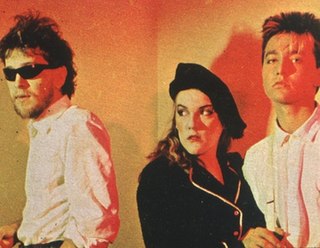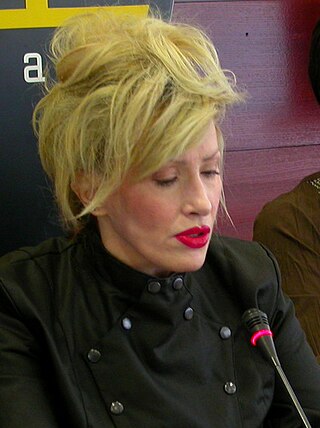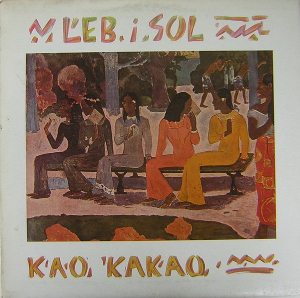
The Macedonian music refers to all forms of music associated with ethnic Macedonians. It shares similarities with the music of neighbouring Balkan countries, yet it remains overall distinctive in its rhythm and sound.

Leb i sol is a Macedonian and former Yugoslav rock group founded in the 1970s by Vlatko Stefanovski (guitar), Bodan Arsovski, Nikola Kokan Dimuševski (keyboards) and Garabet Tavitjan (drums). Tavitjan ceded the drumwork to Dragoljub Đuričić for some of the albums, while Kiril Džajkovski replaced Kokan on Kao Kakao and Putujemo. Beside being the most eminent Macedonian band, they were also one of the most important acts of the Yugoslav rock scene.

Vladimir "Vlatko" Stefanovski is a Macedonian ethno-rock jazz fusion guitar virtuoso.

Idoli were a Serbian new wave band from Belgrade. They are considered to be one of the most notable acts of the Yugoslav rock scene, and their 1982 album Odbrana i poslednji dani was on several occasions voted by the music critics as the greatest Yugoslav rock album.
Jovano, Jovanke is a traditional folk song originating from the region of Macedonia. It is popular in and frequently performed in North Macedonia, Bulgaria, and the Macedonia region of Greece. The song has also been adapted and performed in neighboring Balkan states such as Bosnia and Herzegovina, Serbia and Croatia. It is about two young lovers separated by their disapproving parents. The song mentions the Vardar river which runs through present-day North Macedonia and present-day Greece.
Popular music in Yugoslavia includes the pop and rock music of the former SFR Yugoslavia, including all their genres and subgenres. The scene included the constituent republics: SR Slovenia, SR Croatia, SR Bosnia and Herzegovina, SR Montenegro, SR Macedonia and SR Serbia and its subunits: SAP Vojvodina and SAP Kosovo. The pop and rock scene was a part of the general Music of Yugoslavia, which also included folk, classical music, jazz etc. Within Yugoslavia and internationally, the phrases ex-YU or ex-Yugoslav Pop and Rock both formally and informally generally to the SFRY period, though in some cases also to its successor the FR Yugoslavia including Serbia and Montenegro which existed until 2006.

Bastion was a Yugoslav synth-pop band formed in Skopje in 1982. Although short-lived, Bastion was a prominent act of the 1980s Yugoslav rock scene.

Lazar "Laza" Ristovski was a Serbian and former Yugoslav keyboardist of Macedonian descendants, known for being a member of rock bands Smak and Bijelo Dugme, as well as for his eclectic solo work that spanned many different musical genres.

Vladimir "Vlada" Divljan, was a Serbian singer and songwriter. He was known as the frontman of the Serbian and Yugoslav rock band Idoli, one of the bands which initiated the Yugoslav new wave on the music and cultural scene of Yugoslavia in the 1980s, as well as for his solo works.
Badmingtons were a prominent Macedonian punk rock band.
Aleksandar Makedonski was a Macedonian and former Yugoslav rock band.
Aparatchiks were an electronic–experimental duo featuring former Idoli frontman Vlada Divljan and former Leb i Sol keyboardist Kiril Džajkovski, both living in Australia during the late nineties when the band existed. After releasing one EP and one long-play album, the two continued working on their solo projects.
Propaganda was a Yugoslav new wave band formed in Belgrade in 1981. Formed by former Zvuk Ulice and Bulevar members, Propaganda released only one album, Apatija javnosti, and disbanded. After the group ended its activity, Propaganda guitarist and vocalist Kokan Popović continued his career with the band Idoli, where he was soon joined by Propaganda bass guitarist Branko Isaković. Despite being short-lived, Propaganda was a prominent act of the Yugoslav new wave scene.

Aleksandra Milošević Hagadone, better known as Slađana Milošević, was a Serbian and Yugoslav singer, songwriter, record producer, and author.

Nikola Čuturilo, also known as Čutura is a Serbian rock musician. He is known as a guitarist for the band Riblja Čorba, as well as for his solo work.

Dragoljub Đuričić was a Serbia-based Montenegrin drummer.

Stižemo is an album by Serbian and Yugoslav keyboardist Laza Ristovski and Yugoslav drummer Ipe Ivandić, released in 1978.

Den Za Den was a Yugoslav jazz rock group formed in Skopje in 1978. Although short-lived, the band was one of the most notable representatives of the Yugoslav jazz rock scene.
Simon Kiselicki is a Macedonian jazz pianist, composer, and arranger. He is one of the most influential personalities of the upcoming Macedonian jazz scene, as a solo musician and as a member of “The Simon Kiselicki Group”, “Klerzo”, and “La Colonie Volvox”. Kiselicki’s contributions across Europe and the Balkans include being one of the first musicians to bring jazz music to Macedonian stages and clubs at the start of the 90s.

Kao kakao is the ninth album by Macedonian rock group Leb i sol. It contains nine songs. Biggest hits from this album are Mamurni ljudi, Čuvam noć od budnih, Čekam kišu … It was released in 1987 by Jugoton. The album was accompanied by videos for the Mamurni ljudi and Skopje.














